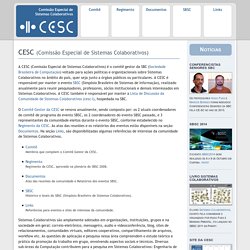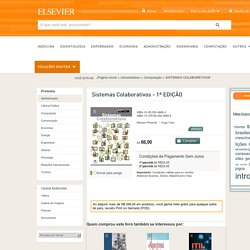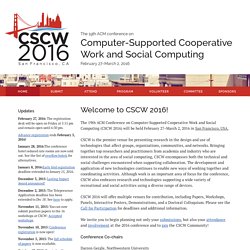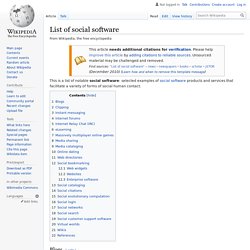

Collaboration Tools - MIT Technology Review. CESC - Comissão Especial de Sistemas Colaborativos. A CESC (Comissão Especial de Sistemas Colaborativos) é o comitê gestor da SBC (Sociedade Brasileira de Computação) voltado para ações políticas e organizacionais sobre Sistemas Colaborativos no âmbito do país, quer seja junto a órgãos públicos ou particulares.

A CESC é responsável por manter o evento SBSC (Simpósio Brasileiro de Sistemas de Informação), realizado anualmente para reunir pesquisadores, professores, sócios institucionais e demais interessados em Sistemas Colaborativos. A CESC também é responsável por manter a Lista de Discussão da Comunidade de Sistemas Colaborativos (cesc-l), hospedada na SBC. O Comitê Gestor da CESC se renova anualmente, sendo composto por: os 2 atuais coordenadores do comitê de programa do evento SBSC, os 2 coordenadores do evento SBSC passado, e 3 representantes da comunidade eleitos durante o evento SBSC, conforme estabelecido no Regimento da CESC.
As atas das reuniões e os relatórios dos eventos estão disponíveis na seção Documentos. CESC - Comissão Especial de Sistemas Colaborativos. SISTEMAS COLABORATIVOS. Sistemas Colaborativos é o livro-texto da disciplina homônima do currículo de referência da Sociedade Brasileira de Computação.

Sistemas Colaborativos é a tradução adotada no Brasil para designar os termos: groupware e “CSCW” (Computer Supported Cooperative Work). Neste livro, escrito por pesquisadores atuantes nessa área no país, os conteúdos sobre sistemas colaborativos estão organizados de forma disciplinar. São analisados os sistemas que dão suporte ao trabalho em grupo, tais como redes sociais, sistemas de comunicação, ambientes virtuais colaborativos, dentre outros. CGI.br. Tecnologias colaborativas e o futuro da Internet - Jonathan Zittrain. CSCW 2016. February 27, 2016: The registration desk will be open on Friday at 5:15 pm and remain open until 6:30 pm.

Advance registration ends February 5, 2016! January 28, 2016:The conference hotel reduced rate rooms are now sold out. See the list of overflow hotels for alternatives. January 8, 2016:Early bird registration deadline extended to January 15, 2016. December 3, 2015: Lasting Impact Award announced! December 2, 2015: The Telepresence Application deadline has been extended to Dec 18.
November 11, 2015: You can now submit position papers to the 16 workshops at CSCW: Accepted workshops November 10, 2015: Conference registration is now open! November 5, 2015: The full schedule of papers is now available. October 17, 2015: Reminder: Demos, Panels, Posters, and Doctoral Colloquium submissions are all due November 6th, 2015.
October 17, 2015: We are pleased to announce our closing keynote speaker will be Mike Krieger from Instagram! October 17, 2015: Announcing the CSCW 2016 telepresence initiative. 39a6.content. Ieeecomputer1994. Technology of cooperation. Tools For Thought. Howard rheingold's. MIT Media Lab. Top 100 Tools for Learning 2015. List of social software. From Wikipedia, the free encyclopedia This is a list of notable social software: selected examples of social software products and services that facilitate a variety of forms of social human contact.

Blogs[edit] Clipping[edit] Instant messaging[edit] Internet forums[edit] Comparison of Internet forum software Internet Relay Chat (IRC)[edit] Internet Relay Chat[2][3] eLearning[edit] Massively multiplayer online games[edit] Media sharing[edit] 05 03. What Is Web 2.0. By Tim O'Reilly 09/30/2005 Oct. 2009: Tim O'Reilly and John Battelle answer the question of "What's next for Web 2.0?

" in Web Squared: Web 2.0 Five Years On. The bursting of the dot-com bubble in the fall of 2001 marked a turning point for the web. Many people concluded that the web was overhyped, when in fact bubbles and consequent shakeouts appear to be a common feature of all technological revolutions. Shakeouts typically mark the point at which an ascendant technology is ready to take its place at center stage. The concept of "Web 2.0" began with a conference brainstorming session between O'Reilly and MediaLive International. In the year and a half since, the term "Web 2.0" has clearly taken hold, with more than 9.5 million citations in Google. This article is an attempt to clarify just what we mean by Web 2.0. In our initial brainstorming, we formulated our sense of Web 2.0 by example: The list went on and on.
Presença social. Software studies.